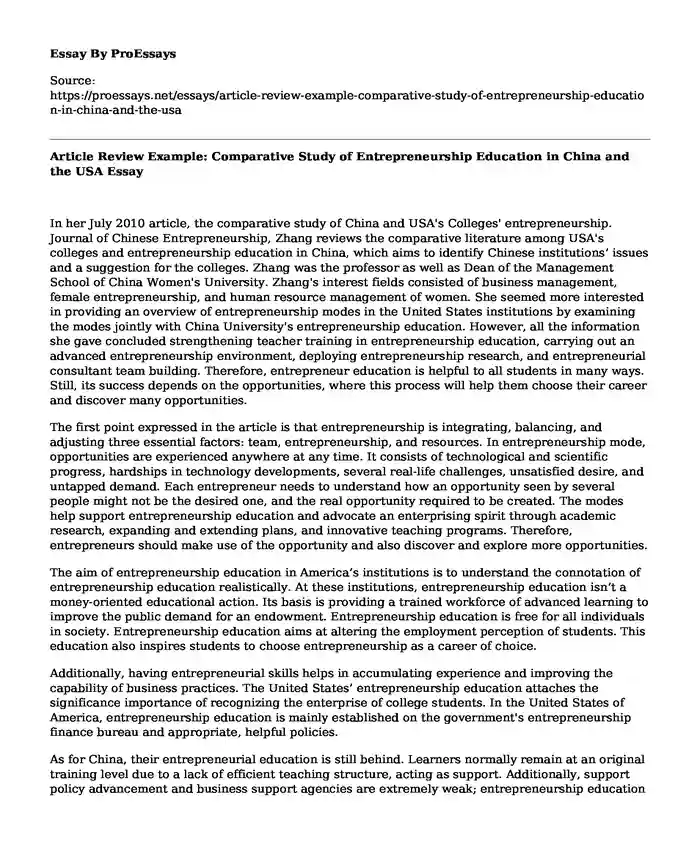In her July 2010 article, the comparative study of China and USA's Colleges' entrepreneurship. Journal of Chinese Entrepreneurship, Zhang reviews the comparative literature among USA's colleges and entrepreneurship education in China, which aims to identify Chinese institutions’ issues and a suggestion for the colleges. Zhang was the professor as well as Dean of the Management School of China Women's University. Zhang's interest fields consisted of business management, female entrepreneurship, and human resource management of women. She seemed more interested in providing an overview of entrepreneurship modes in the United States institutions by examining the modes jointly with China University's entrepreneurship education. However, all the information she gave concluded strengthening teacher training in entrepreneurship education, carrying out an advanced entrepreneurship environment, deploying entrepreneurship research, and entrepreneurial consultant team building. Therefore, entrepreneur education is helpful to all students in many ways. Still, its success depends on the opportunities, where this process will help them choose their career and discover many opportunities.
The first point expressed in the article is that entrepreneurship is integrating, balancing, and adjusting three essential factors: team, entrepreneurship, and resources. In entrepreneurship mode, opportunities are experienced anywhere at any time. It consists of technological and scientific progress, hardships in technology developments, several real-life challenges, unsatisfied desire, and untapped demand. Each entrepreneur needs to understand how an opportunity seen by several people might not be the desired one, and the real opportunity required to be created. The modes help support entrepreneurship education and advocate an enterprising spirit through academic research, expanding and extending plans, and innovative teaching programs. Therefore, entrepreneurs should make use of the opportunity and also discover and explore more opportunities.
The aim of entrepreneurship education in America’s institutions is to understand the connotation of entrepreneurship education realistically. At these institutions, entrepreneurship education isn’t a money-oriented educational action. Its basis is providing a trained workforce of advanced learning to improve the public demand for an endowment. Entrepreneurship education is free for all individuals in society. Entrepreneurship education aims at altering the employment perception of students. This education also inspires students to choose entrepreneurship as a career of choice.
Additionally, having entrepreneurial skills helps in accumulating experience and improving the capability of business practices. The United States’ entrepreneurship education attaches the significance importance of recognizing the enterprise of college students. In the United States of America, entrepreneurship education is mainly established on the government's entrepreneurship finance bureau and appropriate, helpful policies.
As for China, their entrepreneurial education is still behind. Learners normally remain at an original training level due to a lack of efficient teaching structure, acting as support. Additionally, support policy advancement and business support agencies are extremely weak; entrepreneurship education based on academic research is empty. It has failed to form the combined entrepreneurship education platform of schools, government, and industries. Enhancing entrepreneurial education is an essential task for colleges. In the knowledge economy, colleges must be the support of entrepreneurial and creative growth of talents. The college society helps in the promotion of entrepreneurial culture. Thus, universities and colleges must support entrepreneurship and publicize characteristic examples by developing a better public opinion environment. They can also offer funding, policy advice, life support, and technical guidance on how to approach their worries efficiently.
Conclusion
Generally, entrepreneurship education helps students from different socioeconomic backgrounds to nourish exceptional skills, talent, and creativity. It stimulates the economy, guarantees social justice, instills confidence, and generates opportunities. It is a long-term learning process beginning at elementary school and continuing in all educational levels and child education. Entrepreneurship education programs lead to high job satisfaction and enhancement of life status. The advanced level of these education achievements results in higher earnings and decreases the unemployment level.
Reference
Zhang, L. (2011). Comparative study of China and USA's colleges' entrepreneurship education from an international perspective. Journal of Chinese Entrepreneurship, 3(3), 185-194.
Cite this page
Article Review Example: Comparative Study of Entrepreneurship Education in China and the USA. (2023, Dec 29). Retrieved from https://proessays.net/essays/article-review-example-comparative-study-of-entrepreneurship-education-in-china-and-the-usa
If you are the original author of this essay and no longer wish to have it published on the ProEssays website, please click below to request its removal:
- A Discussion of the Teaching Experience and Observations Paper Example
- Children Policy on Ohio For Immigrants - Essay Sample
- Essay Example on Immigration Fuels US Economic Growth: Impact of Immigration Laws in 1965
- Research Paper on Electoral College: America's Founding Fathers' Compromise of 1787
- Essay Example on the Impact of Being a Superpower: America's Global Influence
- Essay on COVID-19 Travel Restrictions: US Defense Secretary Implements Changes
- Sub-Sahara: Helping Struggling Nations Thrive - Essay Sample







